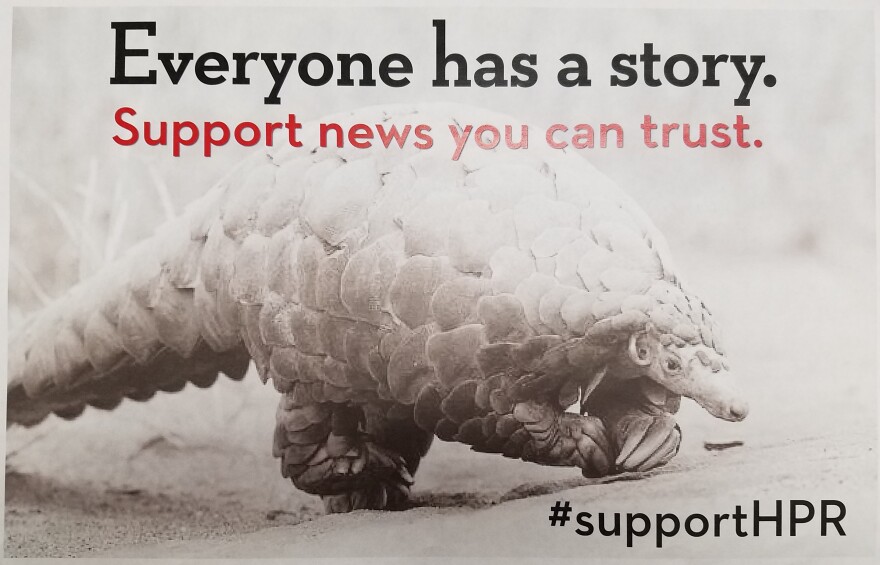An animal whose photograph has been featured on the wall in HPR’s pledge central all week, as seen in the photo of that poster above, has had a terrible last seven days in the news. This critically endangered animal's ongoing struggle to survive against a ferocious poaching assault- driven by Asia Pacific consumers- is ironically why the plight of the pangolin appeared on the wall at Hawaii Public Radio during a week where the size of multiple shipments intercepted and making news underscored the severity of the killing.
The pangolin, a small scaled mammal few Americans have ever heard of or seen, is facing extinction exclusively at the hands of Asia Pacific consumers. And as international wildlife NGO Traffic states, consumers from just two countries, China and Vietnam, are the primary criminals responsible for the deaths of over one million of them in the last decade, though that number may be a low estimate, as conservationists don’t really know how many are left. Over the last week enormous shipments of pangolins have been busted in China (where the report estimated the take represented 15,000 animals) and Vietnam. Also in the news: the first-ever prosecution of a major pangolin smuggler in Malaysia, increasingly a prime transit point to reach those consumers in Vietnam and China. While there are valiant efforts being made to protect the animals, including in Singapore where they are working to preserve and secure their unique Sunda Pangolins, most news about these extraordinarily vulnerable animals is grim.
Not a week after a massive seizure of pangolin scales and elephant ivory was intercepted in Hanoi, Vietnam has pulled down another far larger and more ominous seizure. Last weeks’ one-ton confiscation at the airport in Hanoi – which represented thousands of the world’s most trafficked mammal killed off for Chinese and Vietnamese consumers buying into a myth – was dwarfed by yesterday’s bust: eight tons, which conservationists say is equivalent to tens of thousands of pangolins killed. The seizure was discovered in Danang, Vietnam Thursday, and had come also from Nigeria, the same location as last week’s shipment. This time they were marked as scrap metal in a shipping container. Customs officials in Vietnam were tight lipped, according to the AFP. Vietnam ranks among the least free nations on Earth according to Human Rights Watch, and gets a similar bad review from Freedom House. Along with China, Vietnam is one of the two main countries driving the extinction crises of rhinos, elephants, pangolins, and a contributor to the extinction threat of tigers, lions and the vaquita porpoise (due to rampant demand for the totoaba fish’s swim bladder, and the vaquita being caught in the process).
Many of the consumers in Vietnam who buy the products are Chinese. Conservationists suspect most of the pangolins that make it to Vietnam end up in China. The pangolin is a defenseless, peaceful and timid mammal with scales, which looks sort of like an armadillo. It doesn’t have teeth, curls up in a ball when frightened, and has been exploited to the edge of extinction due to its lack of defenses, and extreme demand from these two countries. All eight species are under relentless assault from poachers who are driven by consumers in Vietnam and China, who buy the pangolin scales due to a false belief, like their similar false beliefs about rhino horn, that they have some medicinal value. After killing off the pangolins of Asia, the species in Africa, like the rhinos and elephants there, are now in the crosshairs of Vietnamese and Chinese consumers.
LEARN MORE:
A nonprofit that is highly respected for their work in rescuing and rehabilitating pangolins is Save Vietnam's Wildlife. Listen for them as guests on Helping Hand later this fall, and learn more at their site about their efforts, and how you can support them. Below is a video that documents their remarkable efforts to care for and rehabilitate pangolins saved from the wildlife trade in Vietnam.




